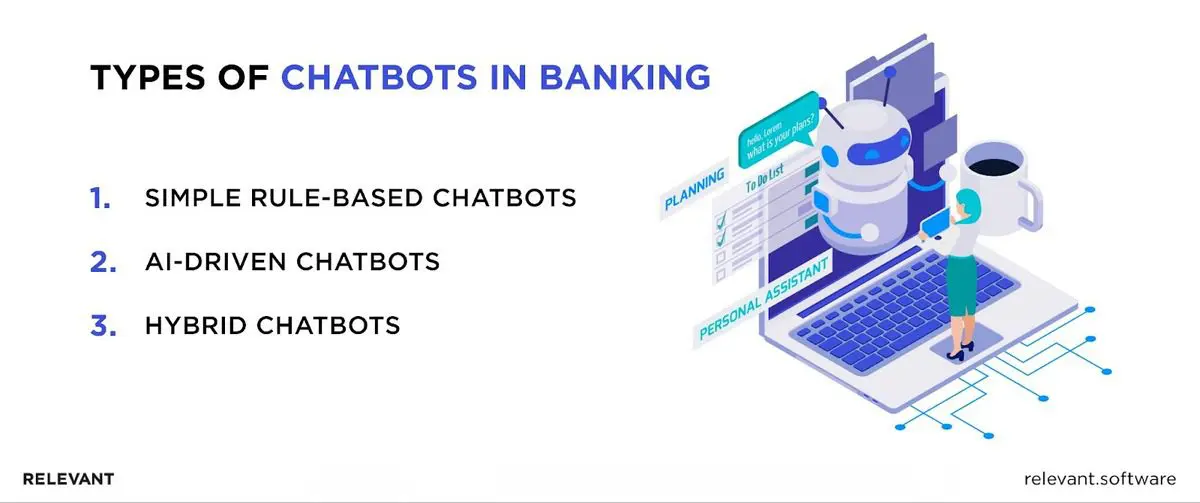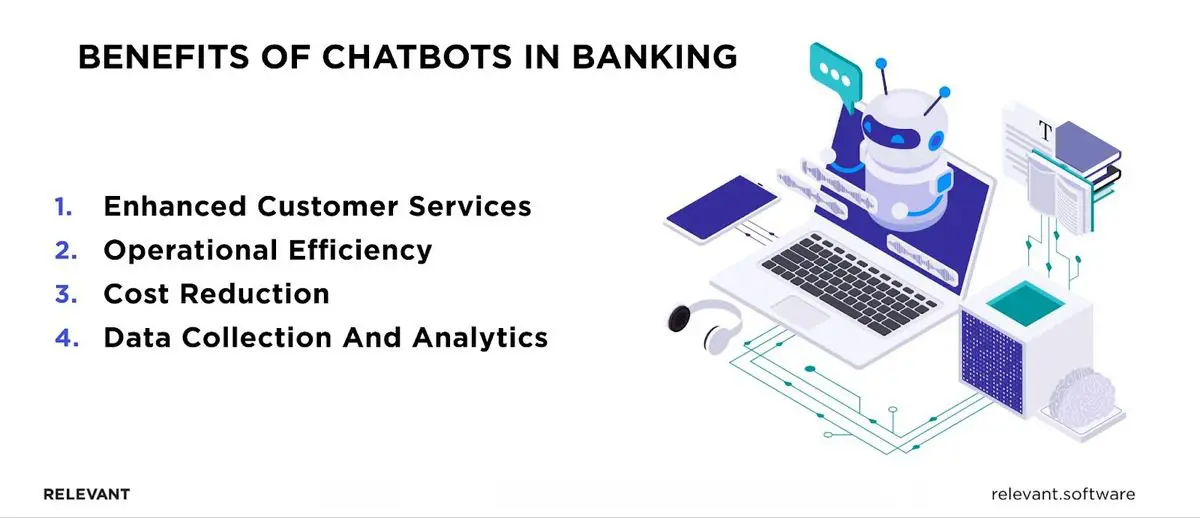Chatbots in Banking: The Secret of Stellar Client Support

There were days when interacting with digital banking tested customers’ patience. Customers often could not find the answers they needed on bank websites due to a lack of information. The long waiting times to reach support compounded the issue and left clients to deal alone with their problems. Spoiler: back then, there were no chatbots in banking.
Nowadays, those struggles are behind us. Things have dramatically transformed thanks to AI chatbot development and implementation to automate customer operations such as checking account balances, processing loan applications, and receiving financial advice, among other routine tasks.
from 25 countries outsourced software development to Relevant
We provide companies with senior tech talent and product development expertise to build world-class software.
Let’s not beat around the bush and consider potential use cases for chatbots in banking in this article.
What Are Chatbots in Banking?
Explaining what chatbots are in banking doesn’t require complex terminology. Inherently, banking chatbots are digital tools that banks use to automate customer service interactions. Designed to converse with customers via text or voice, these AI-powered assistants are available through a bank’s website, mobile app, or social media channels; they promise a solution to clients’ most pressing issues, ensuring 24/7 assistance.
Banking chatbots can be integrated into mobile banking apps or bank websites, originating as either custom or ready-made. Custom chatbots, tailored to specific financial organizations under strict supervision, tend to be more effective and secure. Conversely, ready-made bots offer versatility with some customization options.
Types of Chatbots in Banking
In the banking sector, chatbots are categorized into three primary types, each designed to cater to varying levels of customer interaction and complexity:

Simple Rule-Based Chatbots
Functioning on a foundation of predefined rules and keywords, these chatbots are adept at answering straightforward queries and performing basic tasks. Ideal for routine questions such as account balances or recent transactions, they provide quick and efficient responses. Yet, they fall down in processing complex issues or adapting their responses to meet specific user requirements.
AI-Driven Chatbots
Powered by advanced technologies like machine learning and natural language processing (NLP), AI chatbots in banking industry excel in understanding the nuances of human language and intent. This enables them to provide more personalized responses, improving with every interaction to refine their capabilities progressively. Capable of addressing more complicated tasks, they can provide assistance with financial product suggestions, account problem solving, and even facilitate the loan application experience for users.
Hybrid Chatbots
Merging the straightforward efficiency of rule-based systems with the nuanced approach of AI solutions, hybrid chatbots in banking sector deliver a versatile and adaptive customer service experience. They intelligently determine when to apply simple rule-based responses and when to engage AI capabilities for more complex queries. This dual approach enables them to address a broader spectrum of customer needs.
Key Functions of Chatbots in Banking
Navigating digital banking can be complex for customers, with a maze of products and services to understand and security measures to follow. Imagine how much simpler things would be if there was a clear, direct path to navigate through everything. That’s exactly where chatbots step in, offering their support by providing:

Customer Service and Support
Chatbots in banking sector easily handle FAQs, from account inquiries to fee explanations, freeing up human agents for complex issues. They offer instant access to account details, facilitate routine tasks like password resets, and know when to pass the baton to a human for that personal touch. It’s customer service that doesn’t sleep, making sure help is always just a chat away.
Transactional Assistance
The convenience of chatbots extends to transactions, too. No more queues or confusing websites; chatbots let customers transfer funds, pay bills, and manage payments with a simple conversation. Setting up auto-payments for bills? A breeze. Need to manage checks? Chatbots streamline these tasks, offering a smoother AI banking experience straight from your pocket.
Financial Advice and Planning
Chatbots are becoming savvy financial assistants. They analyze spending to offer budgeting tips personalized to financial habits and can suggest investment directions based on user preferences. And for loans, chatbots speed up eligibility checks, simplifying the initial steps. The use of chatbots more effortlessly integrates banking into daily life. Isn’t that the prospective future of chatbots in banking industry?
Additional use cases for chatbots in banking:
- These automated platforms offer detailed explanations and comparisons of various financial instruments, adjusted to suit the unique requirements of each user.
- Innovatively, certain chatbots are designed with fraud detection features, which safeguard users by alerting them to any suspicious activities and advising on safeguarding measures.
- Additionally, chatbot applications are equipped to provide users with educational content and resources on financial subjects, thereby fostering financial literacy among them.
Benefits of Chatbots in Banking
While it’s easy to think of chatbots as only an external-facing resource, their value extends well into the inner workings of an organization. When employed across all departments, banks can discover benefits such as:

Enhanced Customer Services
Imagine a customer needs urgent help with their bank account on a Sunday evening. Thanks to chatbots, they’re not stuck waiting until Monday business hours. A Juniper Research study in 2023 showed chatbots handled around 85% of customer interactions, underscoring their role in offering support anytime, anywhere.
Besides convenience, сhatbots bring a personal touch, greeting customers by name, recalling past interactions, and offering tailored recommendations based on their financial situation. It comes to fruition. A study by Accenture found that 72% of customers prefer using chatbots for simple tasks because they feel they get faster, more personalized service.
Forget long hold times and frustrating menus. Chatbots quickly deal with common inquiries and simple issues, like password resets or balance checks, slashing wait times, and ramping up satisfaction. Take Bank of America’s chatbot Erica, for example, which manages over 2 million interactions monthly, efficiently solving customer queries.
Also, сhatbots can overcome cultural barriers, offering support in various languages to cater to a broader audience and make e-banking more inclusive and client-friendly. HSBC’s chatbot, for example, communicates in 17 languages, expanding access to more customers.

Source: IBM
Operational Efficiency
Operational efficiency is critical in banking, and chatbots are at the forefront of achieving it. They can handle a significant portion of routine inquiries and transactions, such as checking account balances, transferring funds, or resetting passwords. This frees up human staff for more complex issues that require empathy and critical thinking. J.D. Power reports that chatbots can deflect up to 70% of customer service calls, significantly reducing the workload on human agents.
With chatbots handling repetitive tasks, human agents can focus on higher-value interactions that require their expertise and judgment. According to a study conducted by Forrester, implementing chatbots can lead to a 33% reduction in the time it takes to handle customer service queries.
By directing customers to the most appropriate channel (chatbot or human agent) based on their needs, banks can optimize resource allocation and ensure efficient service delivery. For example, Bank of Montreal’s chatbot, Mia, can triage customer inquiries and direct them to the most suitable agent, improving efficiency and reducing wait times.
Cost Reduction
Automating tasks with chatbots in banking reduces the need for additional human resources, leading to direct cost savings on salaries, training, and benefits. A study by PWC found that chatbots can help banks save up to 30% on customer service costs.
Chatbots require less training compared to human staff, as they learn and improve over time through machine learning. This can lead to significant cost savings on training programs and materials. For example, Bank of America estimates that Erica, their chatbot, has saved them over $1 billion in training costs since its launch.
Improved customer experience typically results in higher levels of satisfaction, which in turn can decrease turnover and save costs by keeping users loyal. It has been observed that customers engaging with chatbots express a higher degree of satisfaction with their banking services, diminishing the chances of them considering a switch.
Data Collection and Analytics
Chatbot interactions provide rich data on customer needs, preferences, and behaviors. Such detailed information becomes the backbone for product development, directing marketing endeavors, and fine-tuning suggestions precisely. Additionally, banks might analyze chatbot conversations to identify common pain points and develop solutions to address them. For example, DBS Bank in Singapore uses chatbot data to personalize its wealth management offerings for individual customers.
Chatbot interactions can be analyzed to identify suspicious activity and flag potential fraud attempts. This can help banks prevent financial losses and protect their customers. Like JPMorgan Chase, which uses its chatbot to detect suspicious login attempts and immediately notify customers, helping to prevent fraud.
Additional benefits of chatbots in banking:
- Increased Accessibility: Chatbots provide an alternative communication channel for customers who prefer digital interactions or struggle with traditional methods.
- Scalability: Chatbots can handle large volumes of inquiries simultaneously, making them ideal for high-traffic periods.
- Brand Building: Chatbots can effectively communicate brand values and personality, fostering a positive brand image.
Note. Such benefits will be reachable after mitigating risks associated chatbots in banking, like data security breaches, compliance challenges, and potential misinterpretations by natural language processing.
But don’t let these disadvantages of chatbots in banking scare you, the advantages always outweigh. You can easily avoid risks of chatbots in banking by collaborating with a fintech vendor which has a proven record in developing secure and compliant solutions.
Build a Banking Chatbot with Relevant Software
The combination of banking chatbots’ analytical strengths with the seasoned expertise of your human team members paves the way for an enhanced work environment and more streamlined customer service practices for your clientele. The only thing you need to do is find an appropriate fintech vendor capable of building a solution that reflects your bank’s specific requirements.
At Relevant Software, we specialize in developing chatbot solutions that transform how you engage with your customers. Forget the old touch-tone wars; our chatbots provide a seamless, conversational interface that can instantly handle inquiries, solve problems, and connect your customers to the right services—without a frustrating menu of options.


Hand-selected developers to fit your needs at scale! Let’s build a first-class custom product together.

